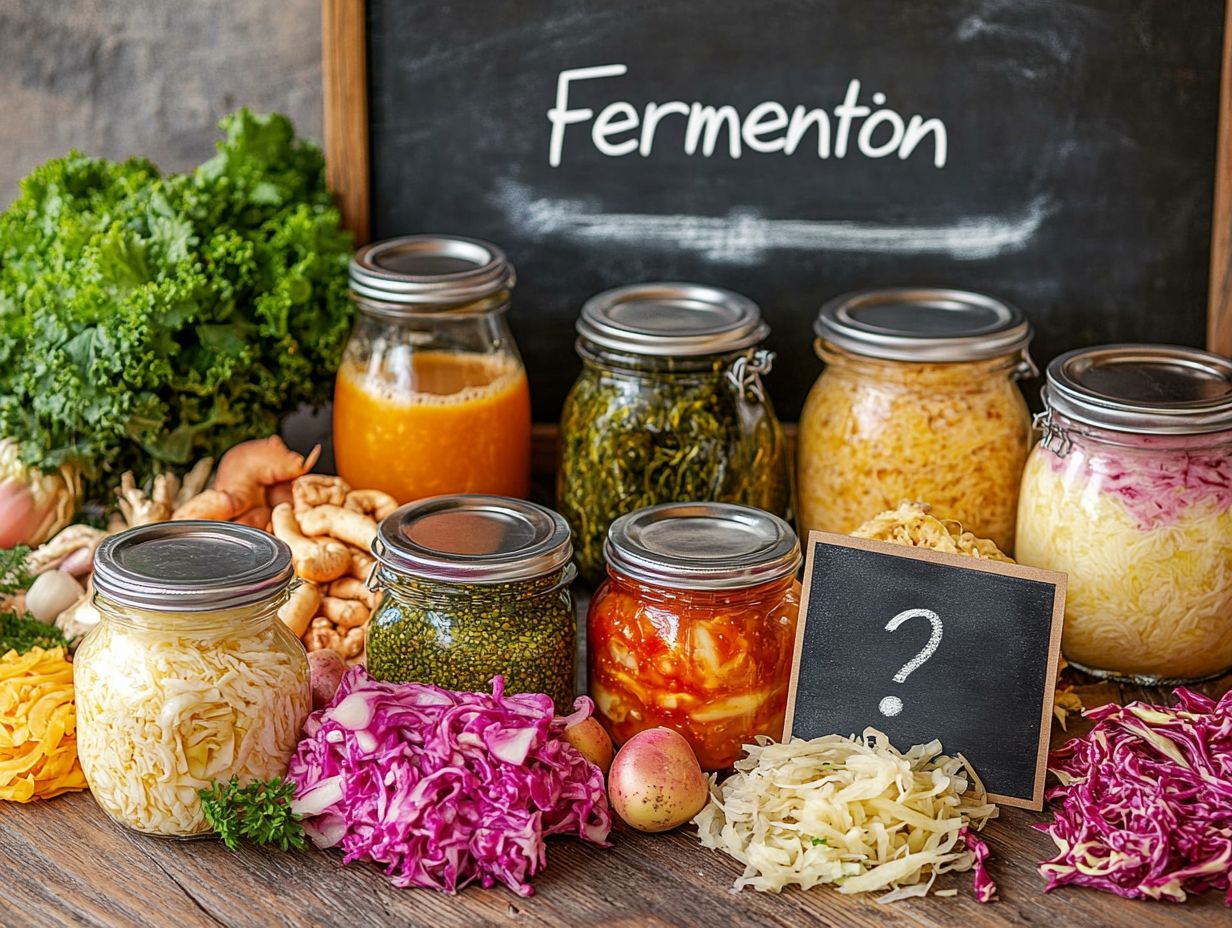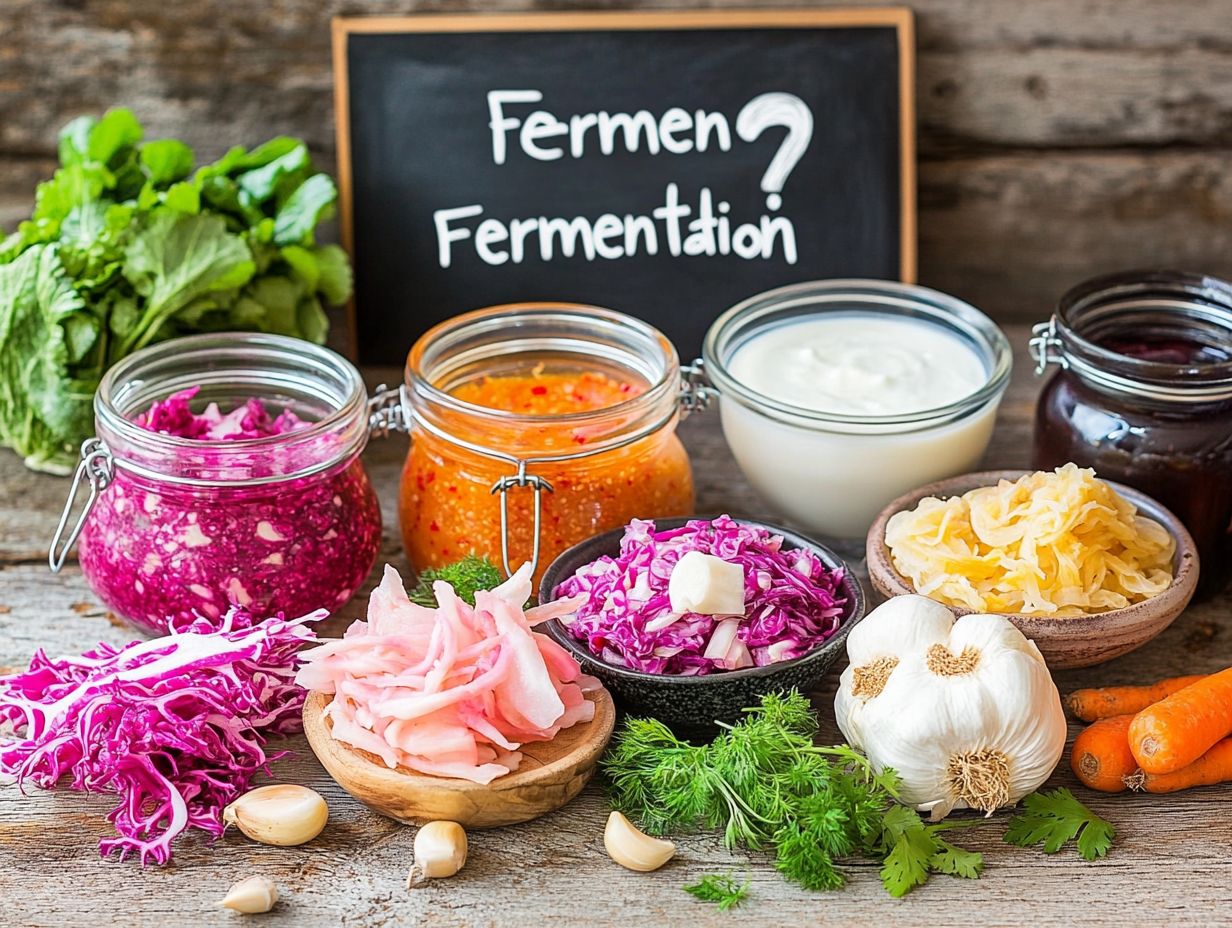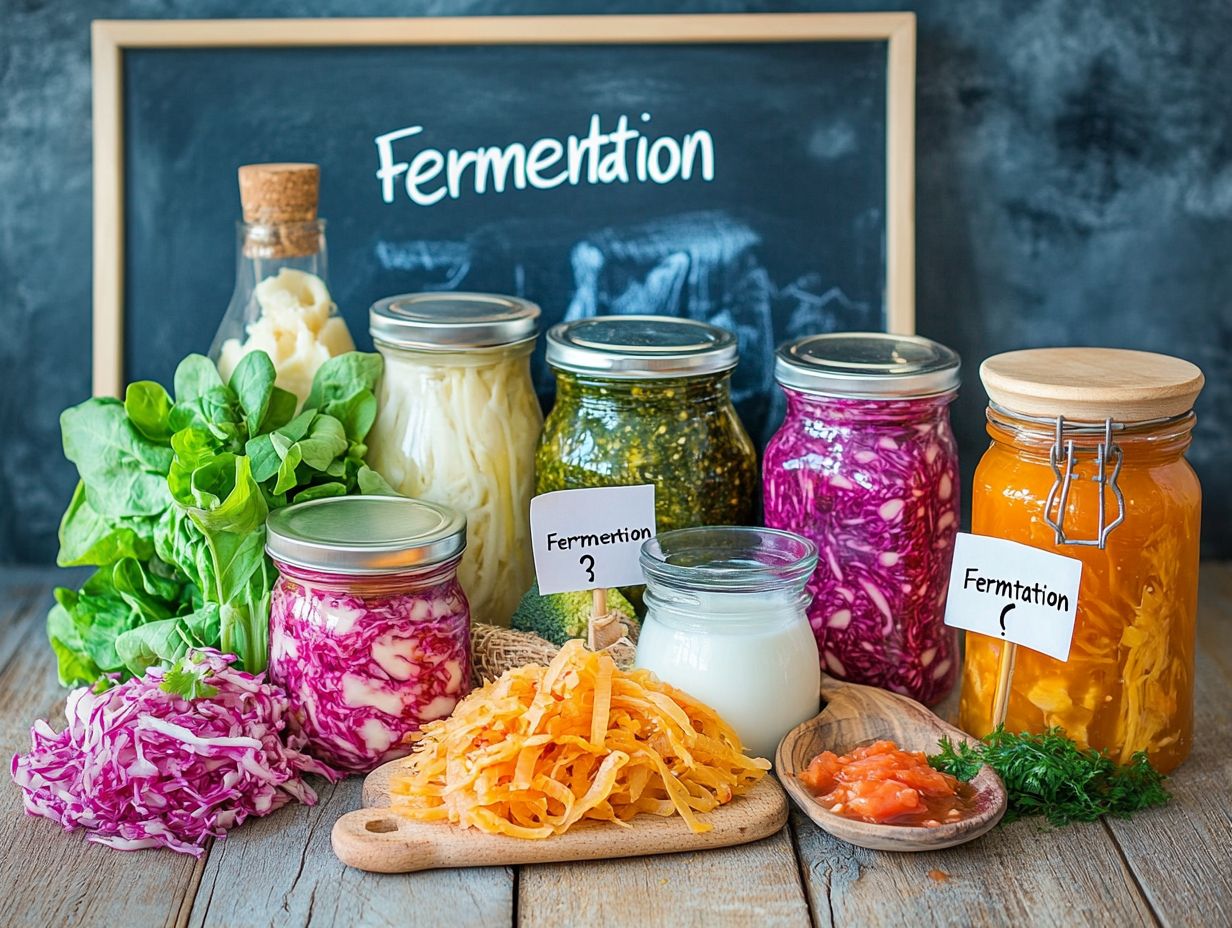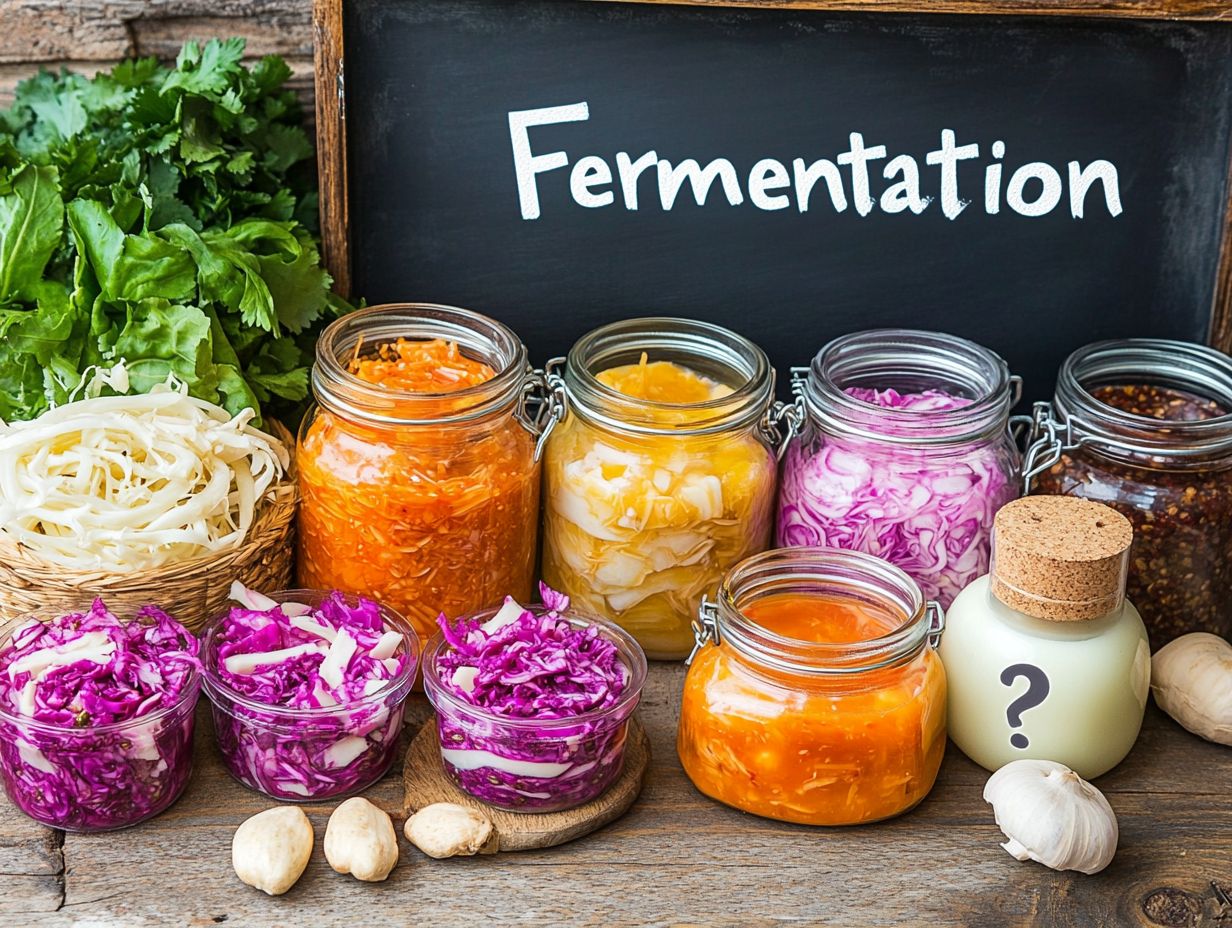Fermentation Myths: Debunking Common Misconceptions
Fermentation is a remarkable process that takes simple ingredients like raw foods, such as apples and zucchini, and transforms them into flavorful, nutrient-dense foods.
From the tangy delight of yogurt to the effervescent charm of kombucha, fermentation not only elevates taste but also brings a host of health benefits to your table. Some fermentation processes even produce trace amounts of alcohol.
In this article, you ll delve into the intricacies of fermentation, explore its various forms, such as pressure fermentation and lacto-fermentation, and uncover the advantages of incorporating these deliciously crafted foods into your diet.
You ll also encounter and dispel common myths and misconceptions that tend to mislead consumers about these culinary treasures.
Get ready to embrace the exciting art of fermentation and savor its diverse offerings, including homemade ferments and low-sugar options like a tangy brew of kombucha!
Contents
- Key Takeaways:
- What is Fermentation?
- How Does Fermentation Work?
- What Are the Different Types of Fermentation?
- What Are the Benefits of Fermentation?
- What Are the Common Myths About Fermentation?
- How Can You Incorporate Fermented Foods into Your Diet?
- What Are Some Popular Fermented Foods?
- 5. Tempeh
- Frequently Asked Questions
- What are some common myths about fermentation?
- Is fermentation a dangerous process? Exploring Fermentation Myths
- Do all fermented foods contain alcohol?
- Is it true that fermentation uses bacteria or mold to create food? Understanding Fermentation Temperature
- Can fermentation be done at home?
- Does fermentation always result in sour or tangy flavors?
Key Takeaways:

- Not all fermented foods are alcoholic, and some are actually beneficial for digestive health.
- Fermentation enhances nutrient absorption and increases probiotic content in foods.
- Incorporating fermented foods into your diet can have numerous health benefits, with tasty options like kimchi, pickles, and sauerkraut.
What is Fermentation?
Fermentation is a remarkable natural metabolic process where tiny living things, called microorganisms think bacteria, yeast, or fungi transform sugars into acids, gases, or alcohol. This fascinating transformation gives rise to a wide variety of fermented foods and beverages, including kombucha, sauerkraut, and yogurt, each offering unique health benefits.
Not only does fermentation elevate flavor profiles, but it also plays a vital role in food preservation, making it a cornerstone of culinary traditions worldwide. For those who are health-conscious and eager to enrich their diets with probiotic-rich foods, grasping the nuances of fermentation is essential.
How Does Fermentation Work?
The fermentation process unfolds as a captivating series of biochemical reactions, where microorganisms like yeast and bacteria transform sugars into simpler compounds. This transformation yields a variety of beneficial by-products, including lactic acid, alcohol, and carbon dioxide, each contributing to the probiotic health of the final product.
The intricacies of this process are influenced by several factors, including the type of food (such as oranges or tomatoes), fermentation temperature, and the specific strains of microorganisms employed. Each of these elements plays a crucial role in shaping the flavor, texture, and health benefits of your final product, whether it s kombucha or other delightful homemade ferments.
What Are the Different Types of Fermentation?
Fermentation can be categorized into several distinct types, each defined by its by-products and the microorganisms involved. Among these, lactic acid fermentation, ethanol fermentation, and acetic acid fermentation stand out prominently.
When you think of lactic acid fermentation, envision the delightful tang of yogurt and sauerkraut, both of which enhance the probiotic content of your diet. Ethanol fermentation plays a crucial role in crafting your favorite alcoholic beverages, including the refreshing effervescence of kombucha and other healthy foods.
Meanwhile, acetic acid fermentation delivers that unmistakable tangy, vinegar-like flavor found in products such as pickles and certain fermented fruits, like apples and oranges. This showcases not only the remarkable diversity of fermented foods but also their numerous health benefits.
Now that you know about the different types of fermentation, why not try making your own fermented foods at home or explore local options available? Dive into the world of fermentation today!
Fermentation is a natural process that transforms sugars into beneficial compounds. Discover the amazing benefits of lactic acid, ethanol, and acetic acid fermentation in enhancing food flavors and improving health.
1. Lactic Acid Fermentation
Lactic acid fermentation is a fascinating natural process that is appreciated by many, primarily carried out by lactic acid bacteria like Lactobacillus. In this process, sugars are transformed into lactic acid, which not only lends a delightful sour taste but also helps preserve food.
You ll find this form of fermentation in a variety of foods, such as yogurt, kimchi, and kombucha, all of which significantly boost their probiotic content, promote gut health, and elevate the overall nutritional profile of these delicious products.
The importance of this fermentation method goes beyond just flavor; it acts as a natural food preservation technique, extending shelf life while protecting against bad bacteria. Take sauerkraut and pickles, for example. They not only gain enhanced flavor through this process but also offer health benefits, including increased vitamins and improved bioavailability of nutrients.
Fermented beverages like kefir and traditional Asian drinks showcase how lactic acid bacteria contribute not just to an explosion of flavors but also to improved digestion and immune support. Similarly, adding gluten-free options to your diet can be advantageous. Choosing these foods can be a savvy move for anyone looking to lead a healthier lifestyle.
2. Ethanol Fermentation
Ethanol fermentation, often referred to as alcoholic fermentation, is an intriguing biological process where yeast, particularly Saccharomyces cerevisiae, converts sugars into ethanol and carbon dioxide. This process is essential in crafting alcoholic beverages like beer and wine, as well as the delightfully effervescent kombucha.
While you might typically associate ethanol fermentation with alcohol, it also has some positive health implications, particularly its role in fostering beneficial bacteria during fermentation. Your journey into this process begins when yeast cells are introduced to a sugar source, which can come from grains, fruits, or vegetables.
Under anaerobic conditions, the yeast goes to work, metabolizing those sugars and generating ethanol and carbon dioxide as by-products. To achieve effective fermentation, certain conditions must be met. You’ll want to maintain an optimal temperature range, generally between 20-30 degrees Celsius, and a pH level that supports yeast activity, typically hovering around 4 to 6.
Monitoring fermentation temperature closely is crucial for success. From this intricate process, a variety of products emerge, including diverse styles of beer, wines, and even vinegar, each boasting unique flavors and health benefits. For instance, moderate consumption of these fermented delights may contribute to improved gut health and provide cardio-protective effects, thanks to the beneficial compounds produced during fermentation.
Products like gluten-free beer and wine are available for those with dietary restrictions.
3. Acetic Acid Fermentation
Acetic acid fermentation is a fascinating process where acetic acid bacteria transform ethanol into acetic acid, imparting that signature tangy vinegar taste to fermented products. You ll often encounter this fermentation type in vinegar production and various fermented fruit products, playing an essential role in both food preservation and flavor enhancement.
Think about foods like pickles and certain sauces; they thrive on acetic acid fermentation, which not only extends their shelf life but also enriches them with probiotics that are beneficial for your gut health. This natural health approach offers numerous advantages over processed alternatives.
The relationship between specific bacteria, such as Acetobacter and Gluconobacter, is crucial to this transformation, influencing the quality and flavor profile of the final product. Take apple cider vinegar, for instance. Its distinct sourness, a cherished component in many dressing and marinades, emerges from this very process.
Beyond just enhancing flavors, acetic acid fermentation acts as a guardian against spoilage organisms, making foods like kimchi and sauerkraut not only safer to consume but also packed with antioxidants and vitamins.
As these fermented delights gain traction, their reputation for promoting digestive health and boosting immunity continues to captivate health enthusiasts, inviting you to explore their myriad benefits.
Benefits of Fermentation
- Enhances flavors and preserves food.
- Boosts probiotic content and gut health.
- Offers health benefits including vitamins and antioxidants.
- Supports digestion and immune function.
Don t miss out on incorporating these amazing fermented foods into your diet for a healthier lifestyle!
What Are the Benefits of Fermentation?

Understanding fermentation myths is essential to fully appreciate its benefits.
Fermentation presents a wealth of health benefits that go far beyond mere food preservation. It enhances the nutritional value and digestibility of various foods while nurturing a robust gut microbiome, thanks to the presence of probiotics.
Including fermented foods such as yogurt, kombucha, and kimchi in your diet can lead to improved digestion, heightened nutrient absorption, and a fortified immune system. Embracing these foods is not just a culinary choice; it s a strategic decision for anyone looking to elevate their overall health and wellbeing. These foods are often low in sugar, making them a healthy option.
Benefits of Fermentation: Preserves Food
One of the best things about fermentation? It preserves food exceptionally well! It extends shelf life and wards off spoilage through the creation of natural acids and alcohol.
When you enjoy fermented foods like kombucha, sauerkraut, and pickles, you’re not just savoring delicious flavors; you’re also choosing safe and nutritious options that can last for extended periods without the need for refrigeration.
During fermentation, beneficial bacteria, such as Lactobacillus a type of healthy bacteria that helps with digestion thrive by converting sugars into lactic acid. This process creates an environment that is inhospitable for harmful microbes. Not only does this natural acidification enhance flavor, but it also serves as a preservative, curbing the growth of spoilage organisms.
This is particularly true for raw foods, which benefit immensely from the fermentation process. Take kimchi, for instance, a beloved staple in Korean cuisine. It relies on this principle, ensuring its longevity while delivering essential probiotics that support digestive health.
Similarly, yogurt benefits from lactic acid bacteria, which promote preservation while providing that delightful creamy texture and taste. These fermented foods are perfect examples of how the fermentation process taps into nature’s own mechanisms to extend freshness and safety. Even fermented fruits, such as apples and oranges, benefit from these processes.
Benefits of Fermentation: Enhances Nutrient Absorption
The fermentation process breaks down complex compounds, making it easier for your body to absorb essential nutrients.
Fermented foods significantly enhance your nutrient absorption by breaking down complex compounds, making essential vitamins and minerals easier for your body to use. The presence of probiotics in fermented products like yogurt, sauerkraut, and kombucha supports your gut health. This, in turn, aids in digestion and the assimilation of nutrients, providing a substantial boost to your overall health and wellbeing.
This process is particularly advantageous for vitamins such as B12 and K2, often found in higher concentrations in foods like sauerkraut and kefir. Minerals like magnesium and calcium also experience improved absorption rates, allowing your body to utilize these vital nutrients more effectively.
For example, miso and tempeh, both rich in protein and minerals, undergo lacto-fermentation that not only increases their nutrient density but also enhances their digestive properties, ensuring that your body can fully capitalize on all the benefits they offer.
Start your journey towards better health by adding fermented foods to your meals today!
3. Increases Probiotic Content
Fermentation dramatically enhances the probiotic content of your foods, offering beneficial bacteria like Lactobacillus and Saccharomyces that nurture a healthy gut microbiome and contribute to your overall well-being. Think of foods like kombucha, kimchi, and yogurt these are packed with live probiotics that can elevate your digestive health, fortify your immune system, and even boost your mental wellness, making them excellent additions to a well-rounded diet.
This remarkable process of fermentation happens when beneficial bacteria and yeast break down sugars and starches in food, resulting in lactic acid and other compounds that not only preserve the food but also amplify its health benefits. Take kefir, for instance a fermented milk drink that boasts a diverse range of probiotic strains to support your gut flora. Similarly, fermented vegetables like sauerkraut, kimchi, and pickles deliver abundant vitamins and enzymes.
Incorporating these foods into your daily nutrition can cultivate a flourishing digestive system, alleviating issues like bloating and irregularity. By enjoying these fermented products, you can enhance nutrient absorption and bolster your immune response, underscoring their vital role in contemporary dietary practices. Embracing homemade ferments can further personalize your healthy diet.
What Are the Common Myths About Fermentation?
Despite the wealth of health benefits and the growing popularity of fermented foods, several common misconceptions and fermentation myths linger that might prevent you from including these nutritious options in your diet.
You may think that all fermented foods are either alcoholic or overwhelmingly sour with a strong vinegar taste, overlooking the incredible variety of flavors and types available, including delightful low-sugar options like kombucha.
It s important to tackle these myths head-on, as doing so will enable you to appreciate and embrace the myriad advantages that fermented products can offer.
1. Fermented Foods Are Always Alcoholic
One of the most prevalent myths about fermented foods is the assumption that they are always alcoholic. This leads many to believe that products like kombucha are packed with high levels of alcohol. In truth, while some fermented foods do undergo a process where sugar is turned into alcohol, others can be expertly crafted to contain low or even negligible alcohol content, making them ideal for a diverse audience seeking health benefits without the risk of intoxication from trace amounts of alcohol.
The fermentation process involves a fascinating interplay of microorganisms, primarily yeasts and bacteria, working diligently to break down sugars and produce acids. In some cases, this process also produces alcohol. For kombucha, the fermentation typically results in alcohol levels hovering around 0.5% to 1.5%, which is significantly lower than traditional alcoholic beverages like beer or wine. Additionally, fermentation temperature plays a significant role in controlling these levels.
Regulatory standards specify that beverages containing less than 0.5% alcohol by volume (ABV) can be classified as non-alcoholic. This classification allows health-conscious consumers or those avoiding alcohol to safely enjoy these products. The unique balance found in these beverages ensures you can reap the benefits of probiotics and other healthful properties associated with fermentation while steering clear of the downsides of higher alcohol content. Pressure fermentation can also help control the alcohol levels in homemade ferments.
2. All Fermented Foods Are Sour
One common misconception you might encounter is the belief that all fermented foods taste sour, which can discourage you from venturing into this vibrant culinary realm. While it’s true that some fermented foods, like sauerkraut and pickles, have that characteristic tang and vinegar taste, many others offer a delightful array of flavors and textures that appeal to diverse palates.
Take miso, for instance; it brings a rich umami flavor to your dishes, while soy sauce provides depth without the sharpness typically associated with sourness. Then there’s kefir, the fermented milk drink that’s often mild and creamy, making it a perfect addition to your smoothies a healthy, probiotic-rich treat.
Don t overlook fermented vegetables either carrots, apples, or beets can be sweetened during fermentation, resulting in a subtle sweetness that’s both refreshing and unique. This vast spectrum of flavors highlights that fermented foods can deliver enjoyment far beyond the typical sour stereotype, inviting you to embark on a delicious journey through their diverse tastes.
3. Fermentation Enhances Nutrient Availability

The misconception that fermented foods are unsafe often stems from a misunderstanding of the fermentation process, causing unnecessary fear of harmful bacteria. In reality, when you prepare these foods correctly, they are not only safe but also offer a wealth of health benefits.
Fermented foods provide a rich source of probiotics and essential nutrients that support your overall well-being. Proper food preservation techniques are key to ensuring the safety of these healthy foods.
It’s vital to understand that adhering to proper fermentation methods and maintaining stringent hygiene practices significantly lowers the risk of spoilage and harmful pathogens. By using fresh, high-quality ingredients and ensuring cleanliness throughout the preparation process, you can savor the many benefits of these foods without any concerns.
Elevated fermentation temperatures and natural health principles also play crucial roles in the safety and effectiveness of homemade ferments. Products like yogurt, sauerkraut, and kombucha, when crafted following established guidelines, have a proven track record of safety and health benefits.
This should reassure you that you can confidently incorporate well-prepared fermented foods into your diet, enhancing not only your culinary experiences but also contributing to your long-term health. Fermented raw foods can be a delightful addition to any meal plan.
4. Fermentation s Impact on Nutrients
A common myth suggests that fermentation destroys nutrients in foods, which understandably raises concerns for those who prioritize their health. However, research reveals a different truth: fermentation often enhances the body’s ability to use nutrients, making them more accessible and beneficial to your body.
It also introduces valuable probiotics that can significantly improve your digestive health. Addressing these common misconceptions can help more people appreciate the true value of fermented foods.
Take fermented dairy products like yogurt, for example. During fermentation, lactose is broken down into simpler sugars, allowing individuals who are lactose intolerant to enjoy these foods without discomfort.
Vitamins such as B12, folate, and riboflavin are produced in greater quantities during fermentation, showcasing the immense health benefits of these probiotic-rich foods. Studies have shown that this process also increases the availability of essential minerals like iron and zinc by breaking down phytates, compounds that hinder mineral absorption.
This highlights that fermentation temperatures and conditions play an essential role in nutrient retention. This enhancement of nutrient bioavailability underscores fermentation’s vital role not only in preserving food but also in amplifying its nutritional profile.
Even gluten-free options can benefit from the fermentation process, offering a broader range of healthy foods for everyone.
How Can You Incorporate Fermented Foods into Your Diet?
Discover how easy it is to boost your health by incorporating fermented foods into your diet! This presents an exquisite opportunity to elevate your overall health and well-being while indulging in their rich probiotic content and distinct flavors.
Delicious options like fermented carrots, beets, and even tomatoes can diversify your meals. By adding delightful options like kombucha, yogurt, kimchi, and sauerkraut to your meals, you can savor an array of taste profiles while reaping the myriad health benefits these foods offer.
This can include creative additions like fermented zucchini and oranges, which add unique flavors to your dishes. With just a few thoughtful adjustments to your diet, you can experience improved digestion and enhanced nutrient absorption, transforming your meals into a nourishing experience.
What Are Some Popular Fermented Foods?
A diverse array of popular fermented foods can seamlessly enhance your healthy diet, delivering not only delightful flavors but also impressive health benefits. The inclusion of gluten-free fermented foods further expands the possibilities for those with dietary restrictions.
Among these options, kombucha reigns supreme as a tangy elixir that many have come to love, while yogurt serves as a creamy powerhouse of probiotics. The inclusion of kombucha, often referred to as a tangy brew, adds a delightful twist to traditional beverages.
You ll also find sauerkraut, kimchi, and tempeh among the favorites, each bringing its own distinct taste and nutritional profile to the table. These foods enrich your meals and promote optimal gut health.
1. Yogurt
Yogurt stands out as a celebrated fermented dairy product, teeming with probiotics that bolster your digestive health and enhance nutrient absorption. This delightful creation is born from the fermentation of milk with specific bacterial cultures, resulting in a creamy texture and a tangy flavor that can be savored on its own or incorporated into a myriad of recipes. The probiotic health benefits of yogurt are widely recognized, making it a staple in many balanced diets.
Beyond its impressive health benefits, yogurt’s versatility makes it an essential ingredient in any kitchen. You can blend it into smoothies for a luscious, creamy base, use it as a healthier alternative to sour cream in dips and dressings, or incorporate it into marinades to tenderize meats effortlessly.
When you choose yogurt, opt for those labeled ‘live and active cultures‘ to fully reap the rewards of those valuable probiotics. It’s wise to consider plain, unsweetened varieties or other low-sugar options to keep those sneaky added sugars at bay. From refreshing tzatziki sauce to decadent yogurt-based cakes, the culinary possibilities are truly boundless. Yogurt is a great addition to homemade ferments and can be enjoyed as part of a natural health regimen.
2. Kombucha: The Tangy Brew
Kombucha is a fermented tea that has garnered significant attention for its distinct tangy flavor and potential health benefits, such as enhanced digestion and increased energy levels. This effervescent beverage is crafted by fermenting sweetened tea with a symbiotic culture of bacteria and yeast (SCOBY), including Lactobacillus and Saccharomyces, resulting in a drink that is not only rich in probiotics but also packed with antioxidants. Kombucha often has a slight vinegar taste due to the fermentation process.
Originating over 2,000 years ago in Northeast China, kombucha has captured the hearts of health enthusiasts across the globe with its invigorating taste and numerous claimed benefits. The fermentation process not only gives it that signature fizz but also allows for an array of flavor profiles, depending on the type of tea and any additional ingredients you choose to incorporate. Kombucha is commonly associated with probiotic health and can include healthy bacteria that support the gut.
By brewing at home, you have the freedom to experiment with various flavor combinations think of adding fruits, herbs, or spices to craft your own personalized blend. Popular choices like ginger, lemon, and berries each lend their unique tastes and potential health perks, making your homemade kombucha a delightful and beneficial addition to any wellness routine. Remember, fermentation temperature plays a crucial role in the brewing process, affecting the final flavor and trace amounts of alcohol in the drink.
3. Sauerkraut
Sauerkraut is a delightful traditional fermented cabbage dish that offers a treasure trove of probiotics, enhancing your gut health and digestion while delivering a vibrant tangy flavor. Through the magic of lactic acid fermentation, sauerkraut not only preserves valuable nutrients but also serves as an excellent side dish or a versatile ingredient in various culinary creations. This fermented food is a staple in raw foods diets and natural health practices.
Beyond its appealing taste, sauerkraut is packed with essential vitamins C and K. Its probiotic properties play a vital role in boosting your overall immune function, positioning it as a superb addition to a well-rounded diet. Sauerkraut also fits well into gluten-free diets and is considered one of the top healthy foods due to its rich probiotic content.
Incorporating sauerkraut into your meals is remarkably easy. You can toss it into salads, use it as a zesty topping for sandwiches, or mix it into soups to elevate both flavor and nutrition.
If you re feeling adventurous, making sauerkraut at home is a straightforward and gratifying endeavor. With just finely shredded cabbage and salt along with a dash of patience you can witness the fermentation process transform these humble ingredients into a healthful, tangy delight that you ll be proud to enjoy.
4. Kimchi: The Spicy Fermented Delight

Kimchi is a quintessential Korean dish crafted from fermented vegetables, typically napa cabbage and radishes. It is renowned for its bold flavors and impressive probiotic content. This spicy and tangy delight is not only a cornerstone of Korean cuisine but also boasts a plethora of health benefits, including improved digestion and bolstered immune function.
The fermentation process in kimchi is an excellent example of a process where beneficial bacteria multiply, enhancing the food’s nutritional value. The origins of kimchi span over two thousand years, evolving and adapting through various cultural influences and regional nuances. Today, you can discover an array of kimchi varieties, each boasting unique ingredients and flavors from kimchi infused with green onions and cucumbers to those featuring fruits like oranges and apples.
Incorporating this nutrient-rich condiment into your daily meals can elevate your culinary repertoire beyond traditional Korean fare. Try adding kimchi to your stir-fries for an exciting flavor boost! You can also use it as a vibrant filling for tacos or even blend it into robust soups. For those eager to explore its versatility even further, pairing kimchi with grilled meats or mixing it into fried rice can create a delightful fusion that tantalizes the taste buds. You can also enjoy kimchi with pickles and fresh tomatoes to create unique flavor combinations.
5. Tempeh
Tempeh, a fermented soybean delicacy from Indonesia, is celebrated for its impressive protein content and distinctive nutty flavor. This powerhouse of probiotics provides a delectable meat substitute for vegetarians and vegans. It also offers a multitude of health benefits, including enhanced digestion and improved heart health.
Tempeh’s fermentation process involves the use of healthy bacteria that enhance its nutritional profile. As a versatile ingredient, tempeh is rich in essential amino acids, making it a complete protein source for those embracing a plant-based lifestyle. Its firm texture is perfect for various cooking methods, whether you choose to grill, stir-fry, or crumble it into sauces and salads.
To seamlessly weave tempeh into your daily meals, consider marinating it in your favorite sauces before grilling to amplify its flavor. You might also enjoy it in tacos or stir-fries, where its hearty nature can truly shine. Tempeh can be crumbled and added to salads or homemade ferments as a protein boost.
For an exciting culinary adventure, whip up a tempeh stir-fry bursting with colorful vegetables and savory soy sauce, or craft a delightful tempeh sandwich layered with fresh greens and creamy avocado, highlighting its wonderfully nutty profile.
Frequently Asked Questions
What are some common myths about fermentation?
Some common myths about fermentation include the belief that it is complicated or dangerous, that all fermented foods are alcoholic, and that it involves using bacteria or mold to create food.
Is fermentation a dangerous process? Exploring Fermentation Myths
No, fermentation is not a dangerous process. As long as proper hygiene and food safety measures are followed, fermentation is a safe and natural way to preserve food.
Do all fermented foods contain alcohol?
No, not all fermented foods contain alcohol. While some fermented foods, such as beer and wine, do contain alcohol, many others, like sauerkraut and yogurt, do not.
Is it true that fermentation uses bacteria or mold to create food? Understanding Fermentation Temperature
Yes, fermentation does involve using bacteria or mold to transform food. However, these microorganisms are beneficial and necessary to the fermentation process and do not pose any health risks.
Can fermentation be done at home?
Yes, fermentation can be easily done at home using simple ingredients and equipment. It is a cost-effective way to preserve food and create unique and flavorful dishes.
Does fermentation always result in sour or tangy flavors?
No, fermentation can create many flavors, depending on the food and the fermentation process. Some fermented foods can be tangy, while others might taste mild or even sweet.
For example, fermenting zucchini or apples results in different flavor profiles when compared to other vegetables. This fascinating process opens up a world of taste possibilities!






